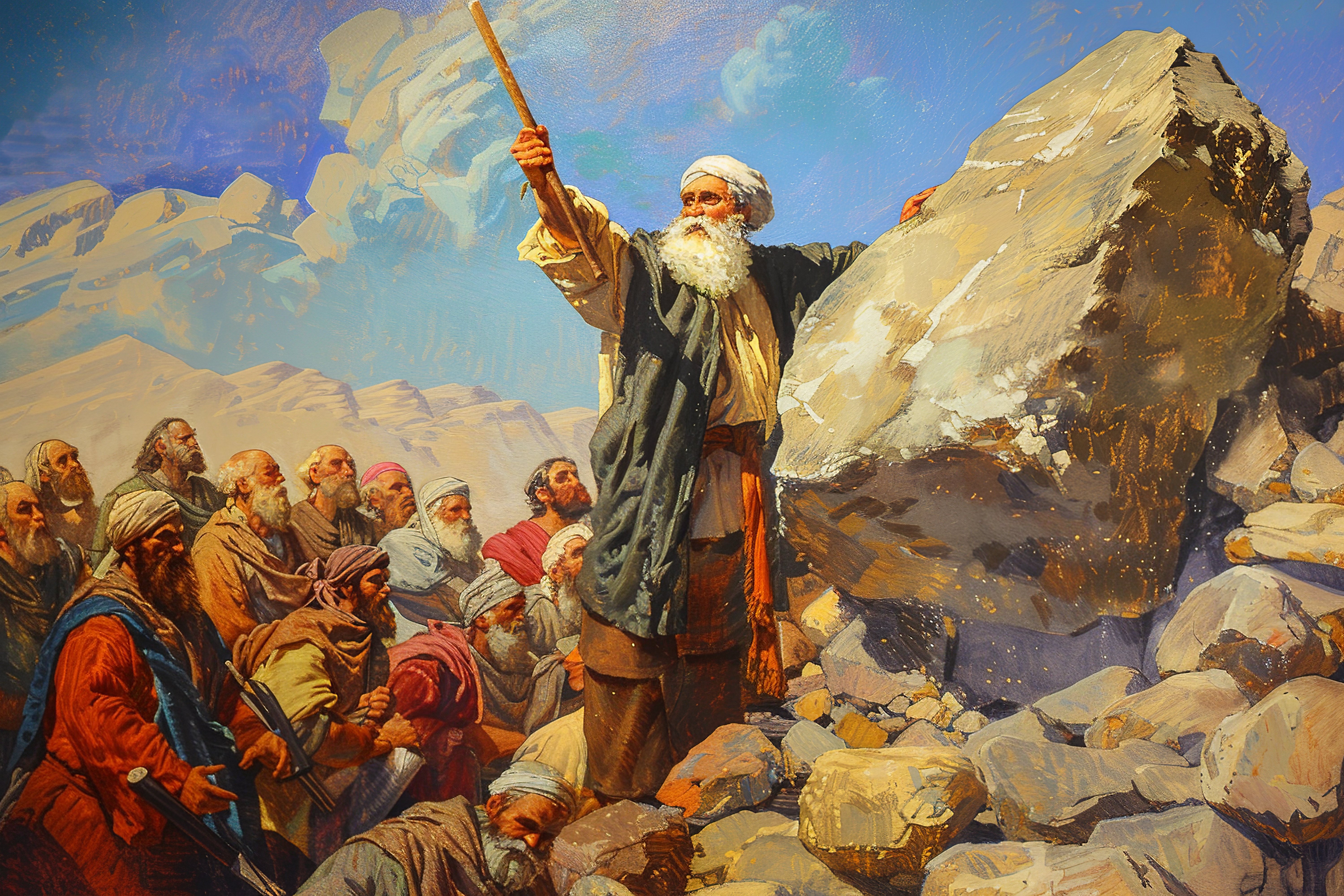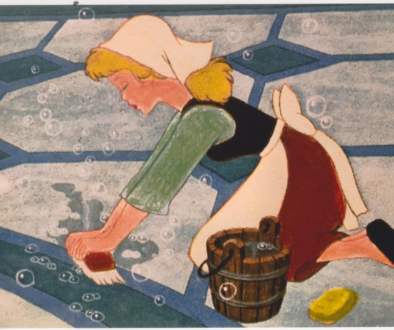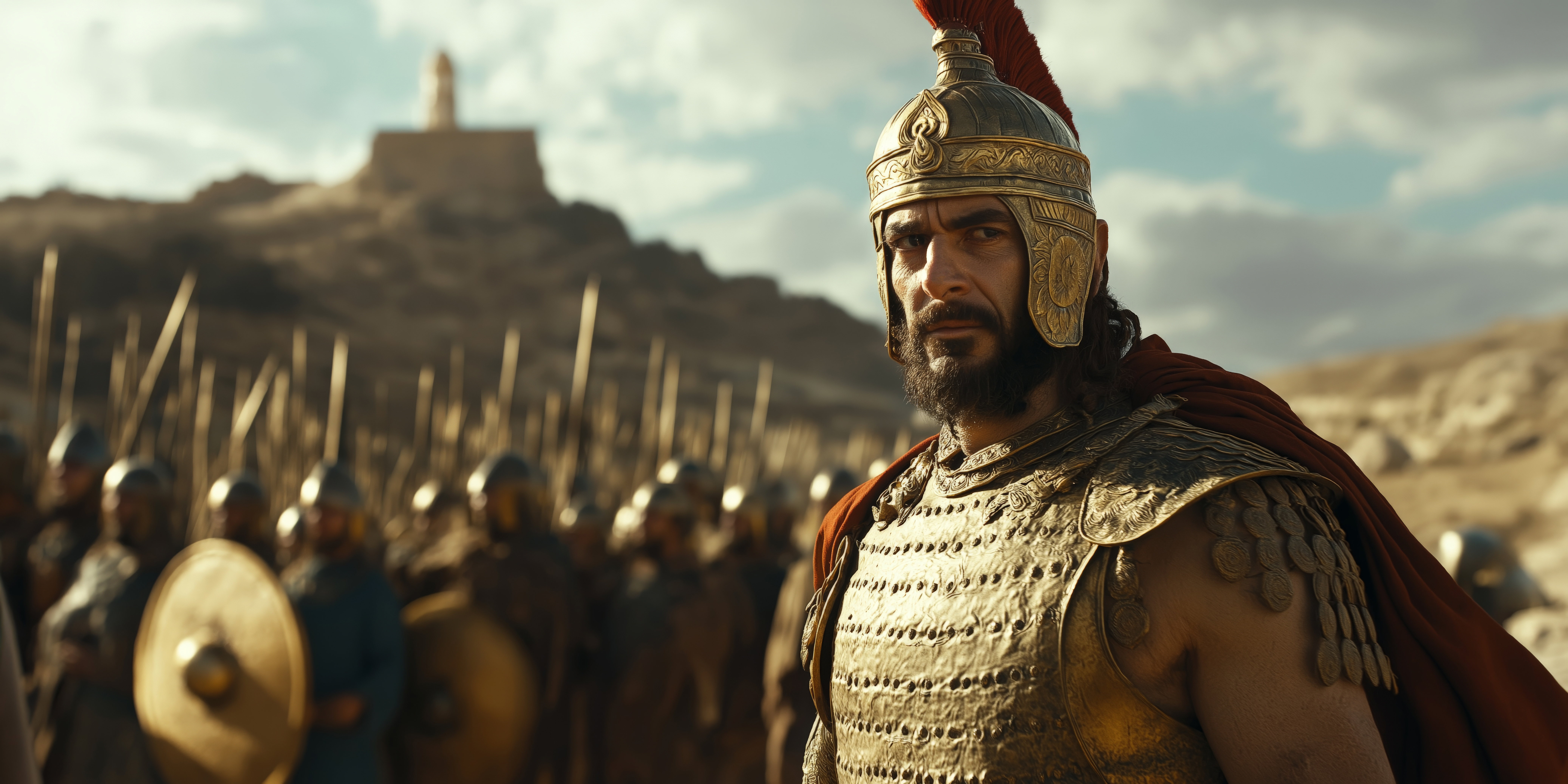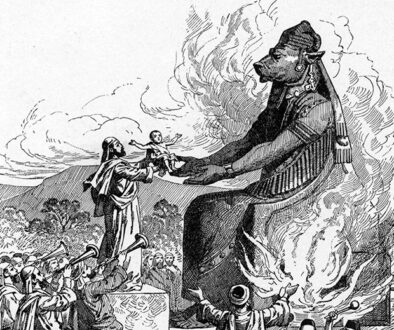Numbers 20 Moses’ Sin
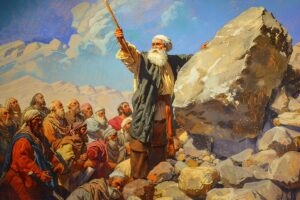
God gave Moses specific directions regarding the people. Moses deviated from His command, and because of Moses’ sin, he and Aaron would both die before reaching the Promised Land.
The people of Israel have been denied entry into the Promised Land because they refused to trust in the Lord. They are on their 40 year wander now. And the grumbling doesn’t stop. It has clearly been established that Moses and Aaron will continue to lead the people, but that is not the end of conflict. Let’s rejoin our group as they face more challenges.
♥ ♦ ♥
God refused to allow the people to enter the land He had promised. He had, however, promised to give it to their children. After their defeat, at the hands of the people in the land, they could only look towards the land and wish. Their rebellions against Moses and Aaron finally brought them all in line.
The time to move into their 40 years of wandering has begun. The pillar of cloud has lifted from the Tabernacle, telling the people to pack up. Within hours, the whole camp is on the move again. There are many forlorn glances back at what could have been as they move on. There are more, though, who refuse to dwell on the past and keep their eyes fixed straight ahead. It has only been a few days since the last of the dead were buried, so most of the adults are silent as they march on. The children feel the weight of their parent’s sorrow, and even they are subdued.
It takes two days on the move before the Lord chooses another site for the people. His pillar cloud comes to a halt near the city of Kadesh. The people breathe a sigh of relief as they begin setting up camp again. With each successive set-up and tear-down, the people get better at the task. There are still the occasional broken poles or missing stakes, but these don’t halt the process like they used to do.
While Moses and Aaron are setting up their tents, they notice that Miriam is unusually quiet. She is usually supervising everyone and dictating where everything should be placed. Today, she is leaning against a pack, silently watching it all.
Moses goes over to check on her. “Are you feeling alright sister?”
“I’m fine. Just a bit tired. This old body can’t do what it used to do. Go on back to your duties” Miriam said as she patted the back of Moses’ hand.
Moses gives her a kiss on the cheek, then returns to his work. He keeps glancing back in her direction though.
When the tents are all erected, Moses and Aaron help Miriam into her tent.
“Stop fussing over me! I have to fix the evening meal” Miriam protests.
“We are big boys now. We can fend for ourselves. You look like you really need some rest” orders Aaron.
“Are you trying to tell me I look old” chides Miriam.
“Never, dear sister” answers both brothers.
Miriam smiles and swats their hands away. “Then go tend to your supper. I will be fine in here by myself.”
The brothers leave and, somehow, manage to prepare a meal for themselves. Once they have everything ready, they take a portion to Miriam.
Moses knows something is very wrong as soon as they enter her tent. She didn’t answer them when they called out their greeting before entering. And Miriam is slumped over near her pallet. Moses quickly advances to check on her.
“She is gone, brother” Moses pronounces after seeing the look on her face. Her eyes were glassy, but the rest of her face looks completely peaceful. Her chest is not rising or falling either.
The two brothers let out a mournful wail and tear their robes. After saying their final ‘good-byes’ Aaron goes to find someone to bury Miriam. Moses will stay with her body until time to bury her.
It has been two days since Miriam was laid to rest. Mourning will continue for many more days, but life in the camp won’t allow Moses time to sit and dwell on his loss. Life goes on.
The area the Lord indicated for them to settle had a problem. The water that was initially available has all but dried up. There is not enough left for the people and their livestock. The people are getting wrestles; again.
Moses knew the situation as well as anyone else, but he trusted the Lord. Unfortunately, he also knew the people. It was no surprise to him when the whole congregation came to him one morning. He could tell by their faces that this was not going to be a pleasant meeting. As soon as they were within a respectable speaking distance, their leader spoke out.
“Would that we had perished when our brothers perished before the Lord! Why have you brought the assembly of the Lord into this wilderness, that we should die here, both we and our cattle? And why have you made us come up out of Egypt to bring us to this evil place? It is no place for grain or figs or vines or pomegranates, and there is no water to drink.” (Numbers 20:3-5)
Moses was frustrated by these people, but he refused to let it show. He and Aaron went to the entrance of the Tent of Meeting and bowed down to the Lord to pray for the people. Moments later, the Lord spoke to Moses and told him exactly what to do.
“Take the staff, and assemble the congregation, you and Aaron your brother, and tell the rock before their eyes to yield its water. So you shall bring water out of the rock for them and give drink to the congregation and their cattle.” (Numbers 20:8)
Moses stood up and walked into the Tent of Meeting and picked up the staff of Aaron’s that had budded. Seeing it brought a smile to his face. It still held fresh blossoms that gave off a sweet aroma and fresh fruit that showed NO signs of decay. This lightened Moses’ mood; until he stepped out of the tent and saw the people standing before him.
“What is he going to do with that?” “Isn’t that the staff of Aaron?” “Why hasn’t the Lord sent rain?” “This is a waste of time! Just get us out of here.” These words and attitudes flowed through the congregation like tides upon the sand. Some building up and others tearing down.
Moses’ frustration grew with the peoples’ questions. “Can’t they be quite for once and simply wait” thinks Moses. When he finally came to the rock he felt drawn to, he waited for the people to gather around. The questions can still be heard filtering through the group. Moses waited for them to quiet down before he did anything more.
“Finally” Moses thinks. The people are quiet, as they wait on him. Moses looks out over the congregation and shakes his head. When he speaks it is not with love or joy.
“Hear now, you rebels: shall we bring water for you out of this rock?” (Numbers 20:10b)
Moses then raises the staff in his hands and strikes the rock with it. Not once but twice. Water gushes forth from the rock and is enough for all the people and their livestock. The people rush forward to quench their thirst as Moses and Aaron turn and walk away.
Moses hadn’t taken ten steps before the Lord spoke to him again. And the Lord’s words were as filled with frustration as Moses’ had been.
“Because you did not believe in me, to uphold me as holy in the eyes of the people of Israel, therefore you shall not bring this assembly into the land that I have given them.” (Numbers 20:12)
Moses’ shoulders fell and he hung his head. He knew that his actions were not those of an obedient servant. He had let his anger color his actions and attitudes. He had also not proclaimed that this miracle was from the Lord. He had claimed credit for himself and Aaron. He had said “we” when stating ‘Who’ would bring forth the water.
Moses returned the staff to its place before the altar of incense. While in the Tent, he also repented of his sin before the Lord.
“Lord God of Abraham, Isaac, and Jacob; I have sinned before You this day. I let my anger rule me and I did not give glory to You. I am undone! Your are right to deny me entrance into Your Promised Land. You would even be just if You chose to remove me from the place You have put me over Your people. I am VERY grieved over my own actions. Take this anger and frustration FAR from my heart. IF You see fit to continue to use me for Your people, I vow to turn to You when I am frustrated so that I will not fall into this sin again.”
God heard Moses’ humble prayer. “I have called you to stand as leader for the people. I will not remove you. Your actions still carry the consequences I told you about, but you are MY child. And I LOVE YOU. I can use your contrite heart.”
Moses rose from his place before the altar and praised God as he went back to the work the Lord had chosen him for. Not once did he complain to God about his punishment. That doesn’t mean that he didn’t wish God would somehow let him have at least a glimpse of the Promised Land. But going into the Promised Land was NOTHING compared to having a right relationship with the Lord.
(to be continued)
I had long wondered why God got so angry with Moses over him striking the rock, instead of speaking to it. I realized today that it was a relationship issue as much as it was an obedience issue. Moses was angry with the people, and instead of giving that to the Lord, he acted out of it. Moses didn’t rely on the Lord to bring the people water. He went back to what he had done previously. And he didn’t give God the credit for it! He took it himself.
In the first instance of Moses striking a rock and water flowing from it, he isn’t recorded as saying a single word. God also waited on the rock he was supposed to strike. The second time, God didn’t specifically point out the rock he was to speak to. Moses spoke to the people this second time; not the rock.
Something I just noticed when comparing the two instances is that God said “So you [meaning Moses] shall bring water out of the rock for them” (Numbers 20:8b) Did Moses take God’s “you” to mean “he” was the one preforming this act? That also gives Moses’ “you” a little different slant on it.
NEVER doubt that, what God does through our hands, is STILL HIS work. He blesses us with abilities that we use for His Kingdom. And when we misuse our gifts, it IS sin.
Father God, thank You for letting me see new things in Your stories every time we look at them together. I have often wondered about Moses’ sin. I knew that he deviated from Your instructions, but I didn’t really understand the root of his sin. It was a HARD punishment, but one that would remind him of his attitude for the rest of his life. It was a lesson that would NOT be easily forgotten.
THANK YOU for Your forgiveness to Father God. Without it, Moses would not have been able to lead the people the rest of the way. Did the people know of his punishment? Did they understand his sin? Did they even know, or care, about Moses’ trouble? Were they too wrapped up in their own to even care? PLEASE don’t let me get so busy I don’t care about those around me. Forgive me for my attitude this morning when I was busy doing something I wanted to do and made my husband wait while I finished. Forgive me for my frustration with his impatience too. As his mind slips more and more, childish behaviors are sure to come out more often. Help me be patient with him when they do.

